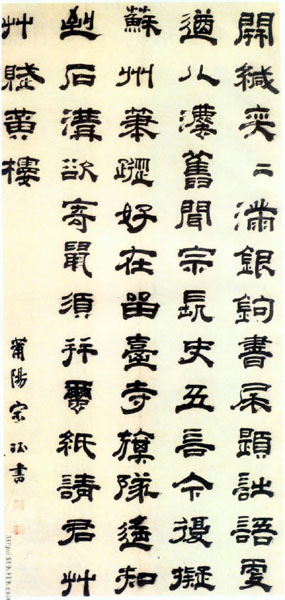Song Jue, also known as Song Yu, was named as Litchi Fairy, Guozisheng, and Lang Taoist. People from Shuangchi Alley (Yinglong Street, Chengxiang District) in Putian City. Ming Shenzong was born in Wanli four years (1576) and died in Ming Chongzhen four years (1632). Song Jue was one of the most talented celebrities in Putian at the end of Ming Dynasty. He was originally a county student and Sheng Caizao. He was unwilling to be constrained by the stereotyped writings, so he was selected as an official, so he discarded it. After entering the Nanjing Imperial College to study, he also abandoned it midway. After that, he stayed in Nanjing, Suzhou and Hangzhou for more than 30 years.
Song Jue is open-minded, likes to make friends, close friends such as Gu Mengyou, Zhong Xing, Tan Yuanchun, Cheng Jiasui, Li Liufang, etc., are famous poets, calligraphers and painters from all over the world. Song Jue often interacted with the giant arms of these literary art gardens, and his talents and talents were also appreciated by the current scholars. Li Liufang had specially built a "pad towel building" to extend his residence, and the two were very close friends. In his later years, Qian Qianyi was regarded as his literary friend and Huang Daozhou was regarded as his friendship friend. When Qian and Huang were in distress, he spared money and defended righteousness, aided in emergencies, and fearless to avoid them. Everyone talked about it as a good talk.
Song Jue is good at calligraphy, but he is proficient in drinking. He is good at Zhang, Xing, Cao, and Li, eight branches of grass, thin and energetic, writing is often unfamiliar, and when drunk, he swears more like a gift from heaven. The eight-point Fu Xia Cheng monument, old and strong, with a brand-new bone structure, when he lived in Jinling, Mao Yuanyi wrote "Wu Bei Zhi", Shenzong called it "the Bo", Yuan Yi is Yan Qitang called "the Bo", he wrote the eight-point book, The writing is more than three feet older, which is the proud pen of his life.
He is also good at painting, painting landscapes in and out of "two meters", Zhonggui, and Yujiu. He can get rid of the habit of painting history, and he has a high and easy way to show between the scales. You Xiujue when he writes on pine and stone, he paints lychee "the color and lustre is no different from life", and his brushwork is magnificent and wonderful. Li Boshi's "Che Gangchuan Tu" is a long scroll with no coloring, and the vertical pen is drawn with creases and wrinkles. It is slightly flexible, self-reliant and innovative. The beauty of his paintings and pens has overwhelmed celebrities. Those who ask for painting and calligraphy, wait for them to get drunk, donate to let them sway, and go away. His pieces of paper are treasures. Many foreign messengers buy them with huge sums of money and collect them at high prices. Song Jue was an important figure in the Wumen School of Painting in the Ming Dynasty. Huang Shen and others, one of the "Eight Monsters of Yangzhou" in the Qing Dynasty, were all influenced by him.
Song Jue and fine seal carving, since it entered the seal with eight points, the first "Putian School" in the history of seal carving. Zhou Lianggong’s "Indian Biography" stated: "The people who were printed in eight points and eight seals began in Biyu, and are known as the'Putian School.' It is specially printed with eight points. "Don't create a pattern, be famous. Qing Hai Ning Zhouchun's "On Yin Poems" said: "It is said that Putian Song Biyu was written, and he created Han Lili books. Aiqi Jingdao renovated, and the ancient law was finally wiped out." He gave a proper evaluation. Cai Xiang's "Litchi Pu" and "Guxiang Zhai Tie", which were carved by him, kept the handwriting of Cai's vividly and were regarded as treasures.
It is a poetic prose that is more elegant than jade, his poems are refreshing and easy to think, his talents are awkward, he believes in the wrist, he has not kept the manuscript, what a pity! He has lived in the south of the Yangtze River for many years, but has a soft spot for lyzis in his hometown. Zeng Peng formed the "Lishe" and became the leader of his own. Every time he went to taste lychees, he would write a poem on the wall immediately. The poem "Reading Jinling Yu Zhongmao's Lychee Cixi Opera" is kept today, with 54 rhymes, Youdao is the longest poem on lychee in history. He regarded lychee as the most noble fruit in the world, saying: "Litchi is a fruit, immortal, and Buddha. There is nothing like it." Song Jue is proficient in rhythm, likes drums and piano, has fun with friends, and meets friends through art. It's fun.
Song Jue still has a lot of ink relics, and he is the author of "Langdaoren Collection", "Guxiangzhai Treasure Cai Tie", and only 8 "Litchi Pupils", "Huanghan Palace Biography" and "Chen Baiyun Poetry Collection Preface" are the only manuscripts left. Articles. Zhejiang Daoist Li Sijing compiled his poems in ten volumes, which are now dead and lost. Song Jue died in Nanjing at the age of 57. Later, with the help of teachers and friends, he was buried in Putian Wenfu Village (now Nanmen Waishanpai Village). In the 14th year of Chongzhen in the Ming Dynasty (1641), Li Sijing was his standing stone tomb, saying that "the heart of the piano, the virtue of wine, the love of the river, the sage of calligraphy and the painting of Zen, the ambassador of overseas purchases." and the title was "famous at home." scholar."

《隶书七律诗轴》








